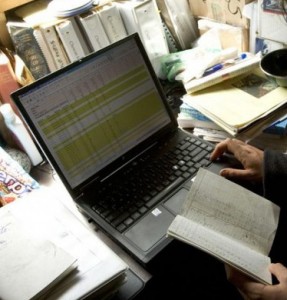To make sense of our field, every now and then we need to step back and take an historical glimpse at how we’re going. If you don’t already do it, then when you scan the journal contents pages for historical contributions and meta analyses. In terms of the recent history of open education and the emergence of MOOCs, you won’t find a better summary than that by the inimitable Stephen Downes. Continue reading
Tag Archives: Terry Anderson
Terry has moved
As I’m sure I’ve mentioned before, one of my favourite links is to Terry Anderson. Since his recent retirement (well, more a semi-retirement really), Terry has upped his online activity, and has recently moved to a personal website rather than a blog. Yes, he still blogs regularly, but his website is much more: relevant, topical, readable and helpful. Continue reading
The wisdom of the ancients: A new book on research in online distance education
Browse the current ICDE website and your eye will likely focus on the the word MOOC. Yes, like everyone else, the ICDE is entranced by the notion and all that it entails, and in doing so has provided helpful summaries of reports and articles that have emerged in the past year. I urge you to ignore it and follow the link under ‘More new items’ to New book from Athabasca University on Online Distance Education. Continue reading
Another free online book: the digitalization critics
When scrabbling around for ideas on a new blog post, I often check the latest offerings of those on my list of links to the right, and good old Terry Anderson has just come up with a cracker. It seems he’d recently spent an evening with the even older (mid-80s) father of distance education, Otto Peters (yes, he coined the term), who had presented Terry with a copy of his latest book: Against the Tide: Critics of Digitalisation. Continue reading
More on OER from IRRODL
Yes, I know I regularly extol the virtues of the International Review of Research in Open and Distance Learning (IRRODL). That’s because it’s good, very good. Its latest special issue (Vol. 14, No. 2, 2013) has just been published, and you can view it all (you should know by now that it’s open access) at Open Educational Resources: Opening Access to Knowledge. Continue reading
Not just MOOCs: catching up with links
MOOCs are the current hot topic. And you might not be just reading about them, you may also be trying them. If so, are you one of the small band of ‘completers’, or did you discontinue? If you did drop out, then you’re not alone, as attested by the interactive graph produced by Katy Jordan. But there’s a lot more than MOOCs going on at present, and one way I try to keep up is to peruse my links from time to time. Continue reading
Online learning sites you haven’t heard of … maybe
 Now here’s a catchy title: ’15 Free Learning Sites You Haven’t Heard of Yet’. Not only enticing, but also challenging – someone thinks they know something we don’t know. And we’re meant to be familiar online learning, so surely we’ve heard of most of them already?
Now here’s a catchy title: ’15 Free Learning Sites You Haven’t Heard of Yet’. Not only enticing, but also challenging – someone thinks they know something we don’t know. And we’re meant to be familiar online learning, so surely we’ve heard of most of them already?
That’s the way I felt anyway, as I satiated my curiosity by clicking the link provided by Sophia Coppolla from Onlinecollege.org in a recent email. How did I ‘score’? Two out of 15: Alison and University of the People, both good sites. Continue reading
Chaos, complexity and shameless self-promotion
No, the title is not a complaint, just a confession. You see, I’m rather thrilled about an article that I’ve just had published in the International Review of Research in Open and Distance Learning (IRRODL). It’s a journal I’ve long admired for its articles, ‘openness’ and the skills of the founder and editor, Terry Anderson. Over the years IRRODL has built up its reputation and readership (last week there were 10,725 visitors!), to the envy of its competitors, I suspect. Continue reading
So where should you publish?
You’ve completed a nice little research project in open and distance learning and are ready to publish the results. Assuming you want to do so in a distance education journal, which one will you choose? Further, should it be one of the newer open access journals, or one of the more traditional ‘closed’ commercially published journals. Continue reading
A report on online learning
I’m frustrated! A couple of weeks ago I noticed Terry Anderson’s blog on the newly-released US Government report, Evaluation of Evidence-Based Practices in Online Learning: A Meta-Analysis and Review of Online Learning Studies. Somewhat curious, I decided to take a squiz at it, but found that the link didn’t work. Continue reading